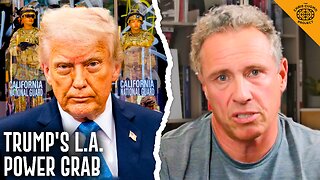Premium Only Content

Hitler's Speech in Munich - March 27, 1924
Background Leading Up to Hitler's Speech in Munich - March 27, 1924
Aftermath of the Beer Hall Putsch: Adolf Hitler’s speech on March 27, 1924, came in the wake of the failed Beer Hall Putsch of November 8-9, 1923. This attempted coup aimed to overthrow the Weimar Republic and establish a new government led by the Nazi Party. However, it was swiftly crushed, and Hitler, along with other key figures, was arrested and charged with treason.
Trial and Imprisonment: Hitler's trial began in February 1924. The proceedings provided him with a platform to promote his ideas and gain public attention. Despite the serious charges, Hitler used the trial to present himself as a patriotic German fighting for the nation’s future.
Political Climate: The Weimar Republic continued to face economic difficulties and political instability. The hyperinflation crisis and widespread dissatisfaction with the government created a volatile environment, which Hitler sought to exploit.
Key Points of Hitler's Speech:
Defense of Actions: Hitler defended his actions during the Beer Hall Putsch, portraying them as motivated by a deep love for Germany and a desire to rescue the nation from perceived threats and decline.
Critique of the Weimar Government: He continued to criticize the Weimar Republic, accusing it of betrayal and incompetence. Hitler argued that the government was unable to address Germany's problems and that decisive action was necessary.
Vision for Germany: Hitler articulated his vision for a strong, unified Germany. He emphasized the need for national revival, economic stability, and the restoration of German pride and sovereignty.
Martyrdom and Sacrifice: He framed his trial and potential imprisonment as sacrifices made for the greater good of Germany. Hitler positioned himself as a martyr for the nationalist cause, willing to endure personal suffering for the future of the nation.
Call to Supporters: Despite the failure of the Putsch, Hitler called on his supporters to remain steadfast and committed to the cause. He stressed the importance of continued activism and dedication to achieving their goals.
Analysis:
Strategic Defense: Hitler’s speech was a strategic defense of his actions and an attempt to turn his trial into a platform for propaganda. By portraying himself as a patriot, he sought to gain sympathy and support from the German public.
Critique of the Republic: The continued critique of the Weimar Republic aimed to undermine its legitimacy and to position the Nazi Party as the alternative capable of addressing Germany’s crises. This critique resonated with many Germans disillusioned with the government.
Nationalist Rhetoric: Emphasizing national revival and sovereignty, Hitler aimed to inspire a sense of duty and pride among his followers. His vision for Germany’s future was designed to attract those seeking strong leadership and decisive action.
Martyrdom Appeal: By presenting himself as a martyr, Hitler sought to elevate his personal stature and to galvanize his supporters. This appeal to sacrifice and dedication was meant to strengthen the resolve of the Nazi movement.
Mobilization of Support: The call to remain committed and active was a key component of Hitler’s speech. Despite the setback of the Putsch, he aimed to keep his movement energized and focused on their long-term objectives.
Overall, Hitler’s speech on March 27, 1924, was a calculated effort to defend his actions, critique the Weimar government, and inspire continued support for the Nazi cause. It sought to turn a moment of personal and political crisis into an opportunity to advance his nationalist and anti-Weimar agenda.
-
 7:58:54
7:58:54
TheBeardedNerdd
8 hours ago🔴 LIVE- Tarkov Labs and what not
7.02K1 -
 13:28
13:28
Actual Justice Warrior
19 hours agoBaltimore Squatters STEAL Taxpayer Funded Housing
29.6K3 -
 LIVE
LIVE
DoldrumDan
6 hours ago $0.17 earnedRAREST WEAPON - CHALLENGE RUN - First Playthrough - Elden Ring ?! DAY 18
149 watching -
 6:29:11
6:29:11
darkprometheus112
7 hours ago $0.18 earnedContinuing MindsEye l Day 2
5.5K1 -
 LIVE
LIVE
B_DubzZ
2 hours ago🔴Live | Warzone
91 watching -
 1:13:58
1:13:58
Larry O'Connor
19 hours ago🚨BREAKING: Democrat Governors TORCHED LIVE! Newsom Attacks OUR SHOW!
19.1K33 -
 8:22
8:22
Nate The Lawyer
1 day ago $1.89 earnedTikTok’s #1 Star Detained & Self DEPORTED in Trump’s Immigration Blitz!
21.5K10 -
 53:21
53:21
The Chris Cuomo Project
1 day agoHow Trump MANUFACTURED the Perfect Political Crisis
26.5K55 -
 5:02
5:02
Sugar Spun Run
23 hours ago $3.16 earnedPasta Salad
86.2K6 -
 8:19
8:19
The Art of Improvement
19 hours ago $7.72 earnedHow to Improve Your Decision-Making
34.2K6